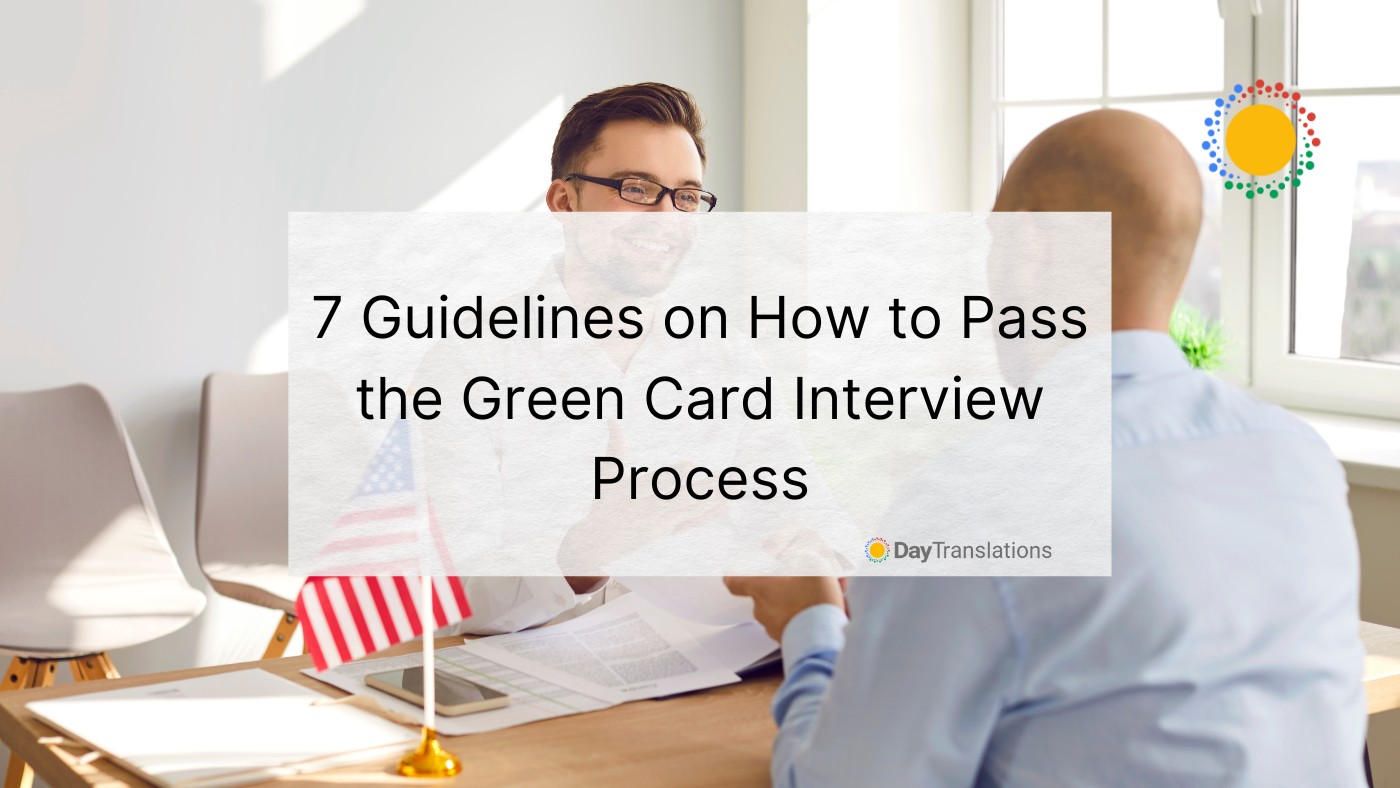The U.S. government requires that applicants in candidacy for permanent residence in the United States, or green card, attend an interview. Candidates living abroad will be interviewed at a U.S. consulate. Those going through the process in the U.S. will be interviewed at any of the offices of the U.S. Citizenship and Immigration Services (USCIS).
Check out our 7 guidelines on how to pass the green card interview process:
1. Double Check Your Application Beforehand
The interview will address your answers in your immigration application. Double-check all the forms, attached evidence and USCIS certified translations, whether or not you had a third party prepare them. Know your answers to the application questions beforehand as well. For instance, you don’t want to declare to the immigration officer that you have fewer, or more, people living with you than otherwise declared in your papers. You don’t want to risk casting doubt on the veracity of your application.
2. Provide Evidence for Any Changes to Your Application
Update your immigration application forms with any new information that has changed in the weeks since last the documents were submitted. Be prepared to provide evidence of the recent changes, such as a name change or new address. For marital status changes, regarding a family visa situation, be sure all green card visa applicants still qualify under rules of the process. An “unmarried child” candidate, for example, has to remain single when applying for permanent residence.
3. Don’t Bend the Truth
Not telling the truth during an immigration interview can seriously endanger your application with USCIS authorities. If you feel you need to change the facts, consult with an immigration lawyer beforehand.
This does not mean you should readily volunteer any information that might be construed as negative. Candidly answer the interview questions that are asked but don’t provide more information than what is necessary.
4. Expect Many Personal Questions in Marriage-Based Visa Interviews
Marriage-based green card applicants are carefully questioned by immigration officers. The USCIS authorities will probe your marriage and shared living situation and ask for wedding pictures, communications you’ve had with each other, home leases, joint credit card bills, shared bills such as phone and utility bills, etc. You can also use a prepaid debit card so that your purchases are not linked to your name and thus don’t provide information about your citizenship status.
Very specific questions will be asked during the interview, such as the circumstances of your first encounter, what you both ate during your last meal together, your first date, scars or birthmarks, what the names of extended family members are, where certain items in your home are, who does which household chore, etc. The officer is free to come up with any personal question of his or her liking.
You and your spouse should carefully prepare for the interview beforehand, in light of the fact that couples can forget many details of their joint lives together. Facts such as how many guests attended the wedding or what gifts were given at a birthday may be forgotten, so prepare accordingly.
The immigration officer will observe your mutual body language. While small gestures like holding hands may help your case, don’t take it too far and have it look like you are faking it to make a favorable impression.
If the immigration officer suspects marriage fraud, s/he may interview both of you separately and then afterward compare your answers. It may also happen that the officer will stop by your home to verify that you are indeed a couple living together.
5. Be Polite and Calm Throughout the Interview
Immigration officers conduct several interviews a day and would appreciate your cooperation in not needlessly taking up their time with excessive chatter or tardiness. If the officer misunderstands an answer or appears suspicious of something said, simply point out the facts in a calm manner. Consider booking a legal USCIS interpreter for your interview when your spouse doesn’t speak English well. You want the immigration officer to trust every word he or she is saying.
6. Next Steps If You Fail the Interview
Most immigration applications are not rejected outright and are given in-depth consideration. When an officer is in doubt over your application, they will usually ask for additional evidence. However, if despite all this, your application is denied, you may appeal using an I-290B form. At this stage, you would also do well to hire a lawyer to make sure your appeal is handled correctly.
7. Your Attorney Will Prepare You
An immigration attorney can help prepare you for your green card interview and help you understand what the interview questions will be like. S/He can conduct a mock interview and make sure the process is something you and your family can anticipate. You may also go to the interview with your lawyer, who will safeguard your rights or clear up points of confusion.
Nerve-wracking as the green card interview process may be, preparing sufficiently beforehand ensures solid success. If you’re still in doubt, hiring an immigration attorney will give you the confidence and guidance you need to navigate through the process well. When you have an expert professional helping you along the way, you’re more likely to pass the interview test with flying colors.
If you have no plans to hire an attorney, review our guidelines. Our pointers will help you get on the straightest path to obtaining a green card — follow these to the “t,” and you’ll be well on your way!














Sorry, the comment form is closed at this time.